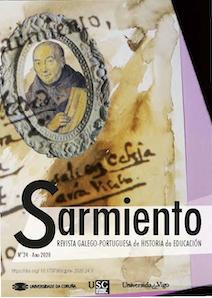An influential actor with an interest in educational models foreigners: José Maria Eugénio de Almeida (1811-1872)
DOI:
https://doi.org/10.17979/srgphe.2020.24.0.7111Keywords:
Casa Pia de Lisboa, José Maria Eugénio de Almeida, pedagogical exchange of ideas, fact-finding tours, graded educationAbstract
The article explores the social and historical background of the educational activities of José Maria Eugénio de Almeida (1811-1872), a prestigious member of the Portuguese economic and political elite of the mid-nineteenth century. The study highlights the context of the international exchange of ideas and Eugénio de Almeida’s particular interest in the German state education systems of the period. His fact-finding tours to some of these states laid the groundwork for the process of pedagogical renewal undertaken at Casa Pia de Lisboa, the educational institution he led for nearly fifteen years (1859-1872). The aim of the study is to assess the impact of this foreign ‘contact’ on the Portuguese education system of the time and to examine the construction of an alternative educational reality (that of Casa Pia de Lisboa) based on a foreign model. In line with Mary S. Morgan’s research on models as experimental things, the study reveals the successful transmission of Eugénio de Almeida’s foreign innovations with the adaptations and accommodations typical of any context of reception.
Downloads
References
Caruso, Marcelo. “Locating educational authority, teaching monitors, educational meanings and the importing of pedagogical models. Spain and German States in the Nineteenth Century”. En Educational Policy Borrowing: historical perspectives, editado por David Phillips and Kimberly Ochs, 59-87. Oxford: Symposium Books, 2004.
Costa, D. António da, Auroras da Instrucção pela Iniciativa Particular. Coimbra: Imprensa da Universidade, 1885.
Fonseca, Hélder e Reis, “José Maria Eugénio de Almeida, um capitalista da Regeneração”, Análise Social, XXIII (99) (1987): 865-904.
Justino, David. Fontismo. Liberalismo numa sociedade iliberal. Lisboa: D. Quixote, 2016.
Marvão, Fátima. Moralização, Trabalho e Educação. O Projecto Educativo da Casa Pia de Lisboa (1852-1922). Dissertação de mestrado, Universidade de Lisboa, 2004.
Morgan, Mary S., “Travelling Facts”. En How Well do Facts Travel?, editado por Mary S. Morgan and Peter Howlett, 3-39. New York: Cambridge University Press, 2011.
Mota, Guilhermina. “O Visconde de Vila Maior: alguns apontamentos sobre a sua vida e ação”. Biblos, X (2012): 246-292.
Nóvoa, António (dir.), Dicionário de Educadores Portugueses. Porto: ASA, 2003.
Phillips, David. “Toward a Theory of Policy Attraction in Education”. En The Global Politics of Educational Borrowing and Lending, editado por Gita Steiner-Khamsi, 54-67. New York: Teachers College, Columbia University, 2004.
Sardica, José Miguel. José Maria Eugénio de Almeida: Negócios, Política e Sociedade no Século XIX. S.l.: Fundação Eugénio de Almeida, 2016.
Silva, Carlos Manique da. “A experiência do ensino mútuo na Casa Pia de Lisboa (1820 -1859)”, Cadernos de História da Educação, 8 (1) (2009): 85-101.
Silva, Carlos Manique da. Do modo de aprender e de ensinar: renovação pedagógica e cenários de experimentação da escola graduada (1834-1892). Tese de doutoramento, Universidade de Lisboa, 2008.
Töpper, Daniel, “Der Weg zur Jahrgangsklasse – Zur Implementierung von Alter als Zuordnungs – und Gliederungseinheit im Schulwesen”. En Berlin-Brandenburger Beiträge zur Bildungsforschung, editado por J. Stiller, C. Laschke, T. Nesyba, and U. Salaschek, 139-163. Bern, Schweiz: Peter Lang, 2020.
Viñao, Antonio, “La Renovación de la Organización Escolar: la escuela graduada”. En Psicología y pedagogía en la primera mitad del siglo XX, coordenado por Gabriela Ossenbach Sauter, 73-104. Madrid: UNED, 2003.






